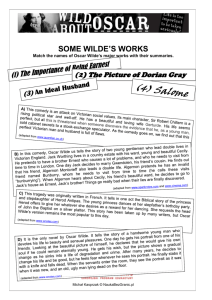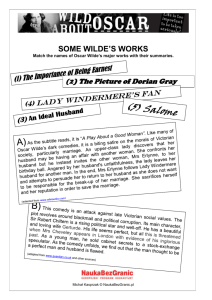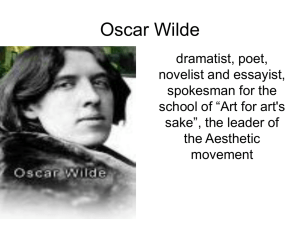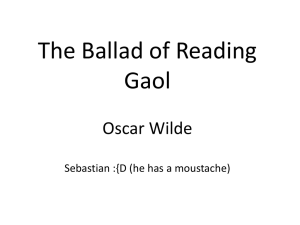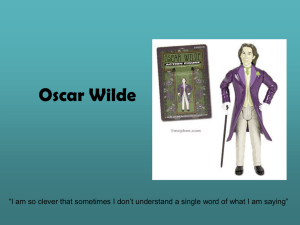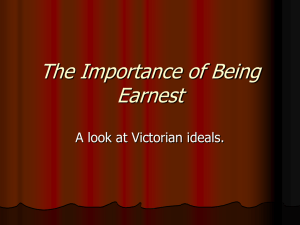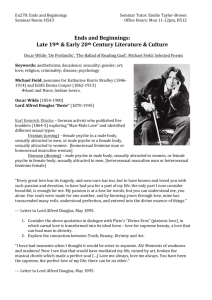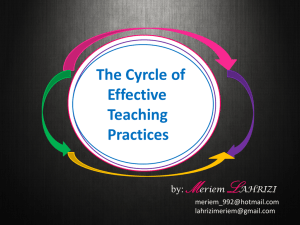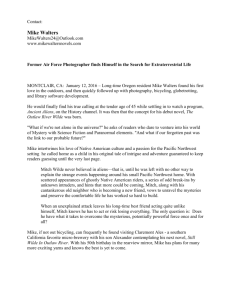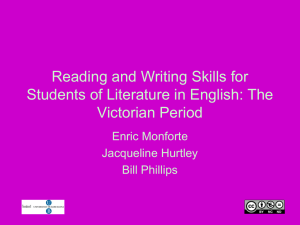syllabus
advertisement
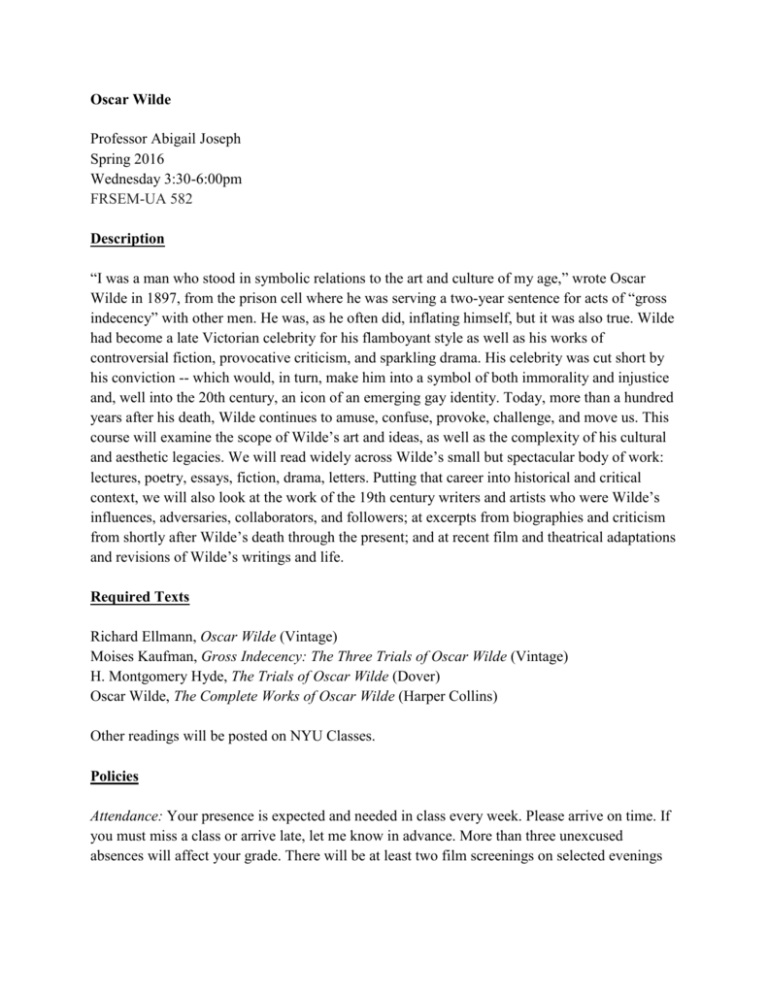
Oscar Wilde Professor Abigail Joseph Spring 2016 Wednesday 3:30-6:00pm FRSEM-UA 582 Description “I was a man who stood in symbolic relations to the art and culture of my age,” wrote Oscar Wilde in 1897, from the prison cell where he was serving a two-year sentence for acts of “gross indecency” with other men. He was, as he often did, inflating himself, but it was also true. Wilde had become a late Victorian celebrity for his flamboyant style as well as his works of controversial fiction, provocative criticism, and sparkling drama. His celebrity was cut short by his conviction -- which would, in turn, make him into a symbol of both immorality and injustice and, well into the 20th century, an icon of an emerging gay identity. Today, more than a hundred years after his death, Wilde continues to amuse, confuse, provoke, challenge, and move us. This course will examine the scope of Wilde’s art and ideas, as well as the complexity of his cultural and aesthetic legacies. We will read widely across Wilde’s small but spectacular body of work: lectures, poetry, essays, fiction, drama, letters. Putting that career into historical and critical context, we will also look at the work of the 19th century writers and artists who were Wilde’s influences, adversaries, collaborators, and followers; at excerpts from biographies and criticism from shortly after Wilde’s death through the present; and at recent film and theatrical adaptations and revisions of Wilde’s writings and life. Required Texts Richard Ellmann, Oscar Wilde (Vintage) Moises Kaufman, Gross Indecency: The Three Trials of Oscar Wilde (Vintage) H. Montgomery Hyde, The Trials of Oscar Wilde (Dover) Oscar Wilde, The Complete Works of Oscar Wilde (Harper Collins) Other readings will be posted on NYU Classes. Policies Attendance: Your presence is expected and needed in class every week. Please arrive on time. If you must miss a class or arrive late, let me know in advance. More than three unexcused absences will affect your grade. There will be at least two film screenings on selected evenings throughout the semester. You are strongly encouraged to attend; if unable to, you should watch the film on your own. Participation: This is a discussion-based seminar, in which we develop knowledge collaboratively. You should always come to class having completed all of the assigned reading, ready to think, listen, write, and speak actively. Writing: All writing assignments are to be turned in on the due date, in class. Writing assignments must be printed and properly formatted in MLA style, double spaced, 1” margins, 12 pt. font, including a separate Works Cited page. Unless otherwise stated, I do not accept written assignments by email. If you are unable to complete an assignment on time and require an extension, please let me know as far in advance as possible.. Otherwise, the grade for any assignment turned in late will be lowered by one step (B+ to B, etc.) per day. Presentations: Each student will be required to give a 10-minute presentation in class introducing the reading for the week and a topic for class discussion. A sign-up schedule will be distributed during our first meeting. These presentations will figure into your participation grade. Reading: This course is reading-intensive. Weekly assignments will vary, but you can expect them to average 80 to 150 pages per week. Be sure that you allow sufficient time to complete the reading. Final Paper/Project: The final for this course may take the form of an academic essay or a creative project. A creative project might be, for example, a film or video, a staged performance, or a portfolio of visual work. If you choose this option you will be required to produce a script, report, or written reflection on your work of equivalent length to the final essay (8-10 pp.). All final papers and projects will include a 10-15 minute oral presentation. Technology: Unless stated otherwise for a particular session, no laptops, phones, or tablets will used in the classroom. You should put all devices away before class begins; you will only need your texts, a notebook, and a pen. Academic Integrity: This university is “a community of scholars who value free and open inquiry” (CAS Academic Integrity). In this class, we work with ideas and language, and it is deeply important to keep track of, and acknowledge, where your ideas and language come from. Plagiarism is the passing off of another’s words or ideas as your own; it is an extremely serious academic offense with serious consequences, including failure of the essay, failure in the course, a hearing with the Dean, and/or expulsion from the university. To quote, again, the CAS statement on Academic Integrity: “Academic honesty means that the work you submit—in whatever form—is original.” This means that you may not submit work written (even in part) by someone else as though it was written by you; and it also means that you may not submit work written for this course in another course (unless you receive permission from both that professor and from me) to do so. Grading Short Paper #1 (3-5p.) 20% Short Paper #2 (5p.) Final Presentation Final Paper or Project (10p.) 35% Participation 25% 10% 10% Schedule Please note that this schedule is subject to change. Check your email and NYU Classes for updates. Week 1: January 27 Introduction • “A Few Maxims for the Instruction of the Over-Educated” • “Phrases and Philosophies for the Use of the Young” Week 2: February 3 Wilde’s Poetry and Its Contexts •Wilde: “Charmides” (CW 753-770), “To Milton” (CW 713), “The Grave of Keats” (CW 776), “La Bella Donna della mia Mente” (CW 751), “Helas!” (CW 709), “Wasted Days” (CW 732), “Madonna Mia” (CW 732), “The Harlot’s House” (CW 789) •John Keats, “Ode to a Grecian Urn” •Algernon Swinburne, “Anactoria” •Dante Gabriel Rossetti, “The Blessed Damozel” Film Screening: Wilde (dir. Brian Gilbert, 1997) Week 3: February 10 Wilde and America •Lectures: “House Decoration,” “The English Renaissance in Art,” “Impressions of America,” “Art and the Handicraftsman” (Online) • “The Canterville Ghost” (CW 193-215) •W.S. Gilbert and Arthur Sullivan, Patience •Excerpts from biographies by Frank Harris, Robert Sherrard, Rupert Croft-Cooke, Andre Gide, and Richard Ellmann Week 4: February 17 Fairy Tales and Short Fiction •A House of Pomegranates: “The Young King” (CW 224-234), “The Birthday of the Infanta” (CW 234-248), “The Fisherman and His Soul” (CW 248-273) •The Happy Prince: “The Happy Prince” (CW 285-292), “The Nightingale and the Rose” (CW 292-297), “The Devoted Friend” (CW 301-310), “The Remarkable Rocket” (CW 310-321) • “Lord Arthur Savile’s Crime” (CW 168-193) Short Paper Due (3-5 pages) Week 5: February 24 Wilde’s Shakespeare •”The Portrait of Mr. W.H.” (CW 1150-1203) • “The Truth of Masks” (CW 1060-1079) • Shakespeare, Sonnets (selections) Week 6: March 2 Aesthetic Theory •Intentions: “The Decay of Lying” “Pen, Pencil, and Poison,” and “The Critic as Artist” (CW 970-1060) •“The Soul of Man Under Socialism” (CW 1079-1105) • Walter Pater, “Preface” and “Conclusion” to The Renaissance • Charles Darwin, The Origins of Species (excerpts) Week 7: March 9 Dorian Gray • The Picture of Dorian Gray (CW 17-168) • J.K. Huysmans, A Rebours (excerpts) • Selected Reviews and Criticism Week 8: March 23 Decadence •”The Sphinx” (CW 833-842) •Salomé (CW 552-576) •Works by Aubrey Beardsley, Alfred Douglas, Ernest Dawson, and others •Excerpts from selected biographies Short Paper Due (5 pages) Week 9: March 30 Comedies (I) •A Woman of No Importance (CW 431-482) •Lady Windemere’s Fan (CW 385-431) Week 10: April 6 Comedies (II) •An Ideal Husband (CW 482-552) •The Importance of Being Earnest (CW 321-385) Film Screening: The Importance of Being Earnest (dir. Oliver Parker, 2002) Week 11: April 13 Wilde’s Trials •H. Montgomery Hyde, The Trials of Oscar Wilde (Selections) •Moises Kaufman, Gross Indecency: The Three Trials of Oscar Wilde Week 12: April 20 Wilde in Prison •De Profundis (CW 873-958) •Excerpts from selected biographies Week 13: April 27 After Reading Gaol •“The Ballad of Reading Gaol” (CW 843-860) •“Two Letters to the Daily Chronicle” (CW 958-970) •Letters (1897-1900) •Excerpts from selected biographies Week 14: May 4 Presentations Final Paper or Project Due (10 pages)
